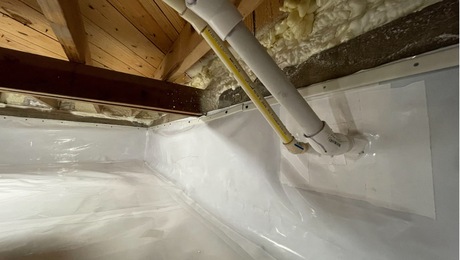Heating, ventilation, and dehumidifying
Hello! I’m new to this forum, so apologies in advance if I leave things out, etc.
My family and I will soon be working with a builder to build a house in western Washington state. The builder is uhm, economical, so it’ll be up to us to specify features that we’d like to incorporate into our house. We’ll also need to be our own experts on some things.
We have two boys with asthma and allergies, so heating, filtration, ventilation and dehumidifying will be important.
The builder has touted the results of the blower door test, so, with that and modern building codes, presumably the house will be pretty tight.
I believe we’ll need a separate ventilation system, with its own ducts for ventilation. I wondered if we could tie in outdoor air filtration and dehumidification to the incoming air in a ventilation system.
Here are a few factors leading me to believe this would be an ideal set-up….
*We won’t always be running heat or air conditioning in our mild climate.
*We’ll need to filter incoming air, especially during the summer wildfire season.
*We will need to dehumidify incoming air because of our humid climate.
Does anyone know of a device or combination of devices that would take care of these various tasks?
Thank you in advance.
GBA Detail Library
A collection of one thousand construction details organized by climate and house part









Replies
There are some parts that will handle de-humidification and ventilation such as:
https://www.minotair.com/minotair-pentacare-v12_en/
Most ventilation systems allow for a filter on the fresh air supply, I run a Merv13 filter box on mine and it makes a huge difference during pollen season. For the build, it is very important to have the house well sealed up (sub 1ACH @50Pa) so that all fresh air enters only through the ventilation system.
I don't know what your cooling load is, so you might still need a separate AC unit and/or de-humidifier. There are some AC units specifically designed to manage humidity in ares with low cooling load, if the ventilation is not enough, it might be a good fit for you:
http://www.daikinac.com/content/residential/single-zone/quaternity/control-humidity/
Thank you Akos! The Minotair sounds like a great fit. I'll have to look into capacity. New house will be around 1700 sq ft. and I don't have the insulation info from the builder yet.
Thank you also for showing the air leakage information.
We had originally hoped to go with well-sealed SIPs or double-stud walls, but we're going to have to compromise. If we discuss specific requirements for energy efficiency with the builder, however, we may find ways to make up some lost ground.
Much appreciated!
Sera
Serabellum,
You can certainly include filtration to the supply air side of your ventilation system, although it is more effective for some contaminants than others - smoke being unfortunately one thing it doesn't exclude particularly well. If you are considering an HRV as apposed to straight ventilation, many of them accept a variety of filters.
Are you sure you need dehumidification? I can't say I've seen any systems incorporating it here on Vancouver Island. Although we get a lot of moisture in winter, once warmed the outside air has quite low relative humidity. Houses with code mandated levels of ventilation typically sit a bit higher RH than elsewhere, but not at levels that cause problems.
Hello Malcolm,
I'll have to search for ventilation that allows air filters. I think we're leaning towards an HRV, but need to speak with the builder about energy efficiency to be sure it will make sense.
Western Washington does have high humidity. This site says an average daily high of 82% and average low of 62% (https://www.currentresults.com/Weather/Washington/humidity-annual.php). Their source is apparently NOAA. We try to keep the moisture below 50% to prevent mold growth.
I'm surprised you haven't had trouble with humidity on Vancouver Island. Are you on the dry side?
Best,
Sera
Serabellum,
I agree with Malcolm. Our ERV (Panasonic/MERV 8 filter) brings in our distant neighbor's smoke from their wood stove. (Wood stoves are not cool, people!)
A passivhaus owner in CA offered a thorough blogpost on this topic a couple years ago. Like you, they worried about particulate matter from local wild fires:
http://midorihaus.com/managing-indoor-air-quality/
The owners concluded that ERV filters aren't enough and that separate air purifiers are required to remove smoke particulate matter.
Hi Rick,
Thank you for your comments on smoke filtration. I'm surprised the filters don't handle smoke well. That's good to know.
I would really like to incorporate all of this stuff into HVAC, but maybe a better solution is to just hang onto all of our freestanding stuff. Hmmm.
Much appreciated,
Sera
> We’ll need to filter incoming air
Note that you will need positive building pressure to prevent outside air from coming in the inevitable leaks.
“The builder has touted the results of the blower door test, so, with that and modern building codes, presumably the house will be pretty tight.”
Please do not assume anything in many places there is no code requirement for air tightness. In the places where a requirement is on the books, often it is a very weak standard like 5 ACH, without any testing requirement. Even the locations that do test rarely do the inspectors read the report and bother to force any corrections.
All builders are salesmen and all tout their products sometimes falsely.
Get it in writing that the finished home will be tested by a third party testing company with a blower door to less than 1ACH.
What are your local codes insulation requirements? They may not be as high as you think.
I am not saying to pick a fight with your builder, but your both need to understand what is being offered and what is expected or everyone will be unhappy.
Walta